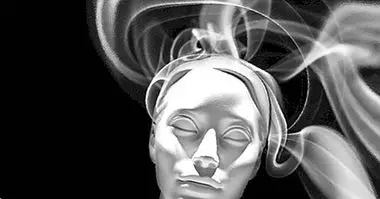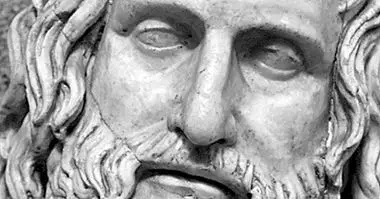12 phenomena to which Psychology can not answer (yet)
The human mind is a complex reality . Psychology was born in order to study this reality, as well as the different elements and processes that make it possible for us to be who and how we are.
However, there are different physical and psychic phenomena that even today remain a mystery for this discipline. Therefore, we present below twelve phenomena to which psychology can not answer today .
- Related article: "10 psychological phenomena that will surprise you"
A dozen phenomena not yet resolved by psychology
Next we present some questions that at the moment could not be explained by psychology , many of them being in the process of research by different professionals.
1. What produces our self-awareness and our subjectivity?
The knowledge of being oneself, of having one's own consciousness and identity and independent of the rest of the stimuli that surround us, is a phenomenon well known and studied by sciences such as psychology.
But nevertheless, it remains unclear what produces or from what concrete structures this self-knowledge is born , which we share with other species such as crows, some primates or dolphins.
2. What happens to our mind when we die?
Death is and has always been one of the great mysteries that the human being has tried to explain from different perspectives . We know that at the moment of death the nervous system, together with the other systems of the organism, stops functioning. However, we still ignore the mental processes that take place during the last moments of life.
Although the cerebral functioning of a dying individual can be explored by neuroimaging, we would only be observing the physiological correlate of the processes followed. This aspect can also be worked on from subjects with near-death experiences or who have been clinically dead for brief moments before being resuscitated.
3. Is it possible to create a machine with conscience?
The search and creation of an artificial intelligence is an element that has always aroused great interest, both literary and scientific. Nowadays we know that it is possible to make a machine perform certain learnings from the acquisition of concrete observation patterns, but it is still unknown if it is possible to create something that is aware of itself.
It is possible that we program something so that it appears to be aware but that in reality it is limited to exercising preprogrammed actions.
4. Can we transfer our mind to another body?
It may sound like science fiction, but there are currently ongoing projects that raise the possibility of transferring the mind of a person to artificial bodies that they should not fear aging or disease. Although the first step is to transplant a brain to an artificial body, it is intended that in the long run the mind and personality of an individual or an artificial brain or even the network can be transmitted.
However, is this possible? And even if it worked, would it be the same mind transported to another body or would the first die and then create a second one with the same memories and tastes, as if it were a clone?
5. What is the origin of Alzheimer's?
One of the most common and increasingly frequent causes of dementia, Alzheimer's disease is among the barriers that science has not yet been able to deal with. Although it is known in an approximate way how the disease acts and the multiple factors that predispose it, it is still not known exactly (although genetic causes are suspected) why it occurs. In fact, for the moment all attempts to develop drugs that end with the amyloid plaques that appear in the brain under the effects of this disease have failed.
Knowing its exact origin could allow working towards a solution of this disease . It is a serious problem that from psychology, neuropsychology and medicine is trying to solve.
6. To what limits can the mind affect the body?
Nowadays, most people know what the placebo effect is, thanks to which a sick person can improve in certain aspects thanks to the belief that taking a product or performing an activity will help them to improve. It is basically a phenomenon of suggestion that causes the brain to generate internal changes through the release of hormones.
Also, the mental state of an individual can greatly alter their immune system and cause it either worsen or become stronger in order to fight against different problems, such as depression or anxiety and certain problems (ulcers, viruses or even cancer). All this makes us wonder where the limits are . It is clear that having a positive mentality will not cure a serious illness, but to what extent can the mind affect the body and how can it be stimulated in order to prolong the well-being, capacities and quality of life of an individual? of great scientific interest.
7. Is there a limit to our memory?
Throughout our lives we are constantly receiving, processing and retaining information. We know that aspects such as our working memory have a certain limit when operating with different stimuli at the same time, but, Does the same thing happen with the ability to store memories?
If our life expectancy increased unlimitedly, would there be a time when we would not be able to record new information?
8. What is it that makes some people say they see the aura or the energy of others?
There are a lot of people who claim to be able to see the energy or aura of others. In some cases this may be an attempt to manipulate others or even an effect of suggestion , but in others people have a real perception of this phenomenon.
Although the most plausible hypothesis is the presence of synesthesia, in which the perception of people can be tinged with aspects related to other perceptual modalities or different dimensions of the same sensory modality (for example, they perceive a color when hearing a sound), It is a phenomenon that has not yet been explained.
9. What makes the brains of the so-called "super elders" not age in the same way as the rest of the population?
The majority of the population, as they get older, gradually loses physical and mental faculties. With age, the brain begins to shrink, losing strength in its synaptic connections and reducing capacities such as attention capacity and memory. It is harder for us to learn and in general we are slower and less plastic.
However, while it is a very unusual condition, there are some individuals whose cerebral aging rate is much lower than the average , being able to have a performance similar to that of his youth. These individuals are called "super old people", and today they continue to investigate what it is that makes their brains maintain such a high performance for so long.
10. How does intuition work?
Many times we have the feeling of being reasonably sure of something that in principle we do not have enough evidence and that in fact do not follow a logical or rational course. This sensation, this non-rational knowledge, is what we call intuition .
Although several theories have been launched that indicate that intuition is due to the unconscious perception of information present in the environment, or that is generated through the accumulation of experiences, there is still no clear basis to indicate how this capacity works .
11. Why do mental disorders appear?
One of the most outstanding areas of psychology is the one that deals with the presence of mental problems and disorders . The origin of these problems can have very different causes, being frequent that there is a biological predisposition that emerges after the experience of concrete situations throughout the development.
However, although sometimes we can see what triggered them, the existence of elements that facilitate their appearance and others that make them difficult (for example personality, beliefs, experience or physiological constitution) and despite the fact that we have numerous techniques and procedures to help patients recover, it is not yet clear why they arise in some people and not in others.
12. How does synchronicity work?
The concept of synchronicity was created by Jung with the purpose of referring to those situations that, without having a probable causal relationship, happen in a concatenated way as if they were related. This relationship has meaning and meaning for the observer, although it seems to be the result of chance.
For example, being on the street with someone you were thinking about moments before, or dreaming of a concrete stimulus that appears casually the next day. However, psychology has not yet been able to determine the meaning and functioning of this concept.



















